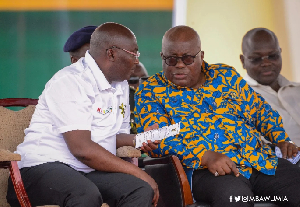The World Bank Group says it provided more than 247 billion dollars to help developing countries boost their growth and overcome poverty during the global economic crisis.
The fund was used to support key areas of infrastructure, the private sector, agriculture, trade finance, social safety nets, education, health, and the environment.
“At the same time, the Bank scaled up support to poor people, countries, and communities which demonstrated that WB is an indispensable innovator, catalyst, and driver of a modernized multilateralism," said Robert B. Zoellick, WB President in a document obtained by the Ghana News Agency.
Mr Zoellick said the Bank had recognized that "we live in a world of multiple poles of growth where traditional concepts of the "Third World" are now outdated and where developing countries have a key role to play as growth drivers and responsible stakeholders".
The WB President noted that for the first time in 20 years, the general capital increased for the Bank, with over half the new capital from developing countries; and a record 90 billion dollars raised for IDA, for the poorest, against a very challenging backdrop of donor austerity.
Recounting the achievements of the Bank over the last five years, Mr Zoellick said the Bank alerted the world to the food crisis, and helped marshal new resources and tools to address it which led to the Bank's agriculture lending increasing to six billion dollars per year.
The Bank created a new International Finance Corporation private sector Asset Management Company to channel sovereign wealth funds and pension resources (to date $3 billion) to the private sector in Africa and other emerging markets.
He said the period under review also saw the Bank promulgating landmark Access to Information policy, and Open Data Initiative which opened the doors on Bank processes, projects, and data; to boost transparency and accountability on all Bank projects.
He said the Bank also advanced its anti-corruption focus with a new sanctions policy, new preventative unit, new cross debarment agreement with other multilateral development banks, new Stolen Asset Recovery (StAR) initiative, and the launch of an International Corruption Hunters Alliance.
Blended innovation and practicality with new programmes such as the Climate Investment Funds which had a $7.1 billion of contributions leveraged nearly $50 billion of investment covering 46 countries.
Business News of Thursday, 16 February 2012
Source: GNA
















